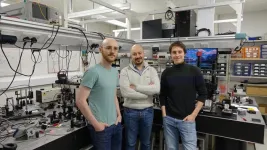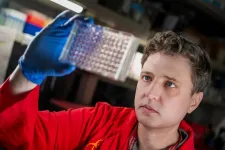(Press-News.org) LAUSANNE, March 18, 2025 – The Open Brain Institute (OBI) launches today as a groundbreaking non-profit organization, transforming neuroscience from the physical to the virtual world. Building on the pioneering achievements of the EPFL’s Blue Brain Project, OBI opens the era of simulation neuroscience—empowering researchers to build and simulate digital brains with unprecedented detail, scale, and speed.
AI has been given access to the software recipe to build digital brains, providing natural language support to researchers to explore, build and simulate digital brains, petabytes of brain data collected from global databases, and the world’s cumulative knowledge of the brain and its diseases.
Establishing Simulation Neuroscience
The Blue Brain Project, founded and directed by Professor Henry Markram, was on a 20-year mission to work out how to forward engineer mammalian brain tissue on supercomputers from limited experimental data and discovered a revolutionary approach to reverse engineer the brain and a recipe to build digital brains. With around 300 peer-reviewed scientific papers, the project demonstrated that these digital brain models closely mirror real brain structure and function—enabling experiments that would otherwise be technically or ethically impossible.
OBI takes this legacy further, hosting virtual neuroscience laboratories where researchers can access:
Open Data, data made available on AWS Open Data Registry under the Blue Brain Open Data.
Open Software with 18 million lines of code to explore, build and simulate digital brains.
Global brain databases curated by the project and the neuroscience community.
An AI companion to guide exploration, modeling, and simulation.
Simulation neuroscience now joins experimental, theoretical, and clinical neuroscience as the fourth pillar to tackle the brain’s complexity. “The Blue Brain Project gave us the proof that the brain can be reconstructed in a computer from limited experimental data,” says Professor Henry Markram, Founder of OBI, who presented this breakthrough at this year’s World Economic Forum. “Today, the OBI brings the recipe to build and simulate the brain to empower researchers to explore the brain in unprecedented detail, and at a scale and speed never before imagined.”
Sparking a Global Collaboration
OBI’s Virtual Labs allow researchers from any discipline, anywhere in the world, to construct digital brain models at multiple scales—from molecular pathways and individual neurons to entire brain regions and whole-brain simulations, in principle of any species, at any age, and in any disease state.
Disease modeling: Study neurological and psychiatric disorders in digital brains.
AI and cognition research: Use digital brains to inspire new forms of artificial intelligence.
Brain-computer interface and neuroprosthetics: Prototype and test neural implants virtually.
Researchers can invite unlimited collaborators into their Virtual Labs, fostering global, interdisciplinary teamwork in ways never before possible.
Visionary Funding
The Blue Brain Project was established at EPFL in 2005, when Professor Patrick Aebischer, then President of EPFL, outbid several prestigious institutions to host and fund the project. His visionary leadership led to 300 million Swiss francs in Swiss Federal Government funding over 20 years. “We recognized that if scientists can replicate the brain in computers, we can explore its functions and diseases in completely new ways” says Professor Patrick Aebischer. “The Open Brain Institute takes our work at EPFL and extends it into an open, global resource. It is exactly what the community needs to accelerate progress and spark new discoveries.”
An EPFL Legacy
As one of the world’s leading research institutions, EPFL continues to drive science into innovation and impact. “EPFL is delighted to support this transition from a long-term audacious internal project to a non-profit platform serving the international neuroscience community,” says EPFL President, Professor Anna Fontcuberta i Morral. “The extensive work accomplished within the EPFL Blue Brain Project will continue to have impact under the Open Brain Institute, providing researchers worldwide with access to cutting-edge virtual laboratories.”
Over 22’000 students have already taken Blue Brain’s on-line courses on simulation neuroscience, preparing for the age of digital brains.
A Catalyst for Neuroscience Breakthroughs
The OBI enables rapid brain research, therapeutic development, and next-generation AI, helping to tackle some of humanity’s greatest challenges:
The brain’s complexity: Understanding perception, learning and action to adapt and thrive, as well as developmental changes, species-specific adaptations, and the origins of disease.
The economic burden: Exploring treatments for brain disorders that cost the global economy trillions annually, yet drug development remains slow, expensive, and inefficient.
Neurotechnology innovation: Rapid virtual prototyping on digital brains to accelerate brain-computer interface, neuromodulation, and neuroprosthetic research and development.
AI beyond machine learning: Studying biological intelligence could unlock new AI architectures and strategies to interact with the world in real time.
“The brain is the only known system that exhibits true generalized intelligence,” says Markram. “OBI’s virtual labs can be used to study how the brain’s natural architecture—evolved over millions of years—creates intelligence, offering radical new directions for AI.”
Join the Digital Brain Revolution
The OBI opens its doors to the Virtual Labs on March 28, 2025.
Researchers, clinicians, industry R&D teams, and AI innovators are all invited.
Virtual Labs accommodate principal investigators, small research teams, and global consortia.
Reserve Your Virtual Lab Today
Visit https://openbraininstitute.org or contact the OBI Communications Office at info@openbraininstitute.org
Conclusion: The Dawn of Digital Brains
The Open Brain Institute marks a historic moment in neuroscience—transitioning decades of pioneering research into an open, global platform.
For researchers, OBI means faster and cheaper breakthroughs.
For clinicians, it means deep access to the latest findings on brain diseases.
For AI innovators, it means working with the only system capable of generalized intelligence.
The next generation of brain science and technology begins now. Be part of it. Register for a Virtual Lab today.
https://openbraininstitute.org, contact: info@openbraininstitute.org
https://bbp.epfl.ch/bbp/research/domains/bluebrain/index.html
https://www.epfl.ch/en/
END
The Open Brain Institute announces the dawn of a new frontier in neuroscience
The Open Brain Institute launches as a not-for-profit organization to make the 18-million-line software recipe to build and simulate mammalian digital brains developed in the Blue Brain Project openly available through AI-powered Virtual Laboratories
2025-03-18
ELSE PRESS RELEASES FROM THIS DATE:
Helicobacter pylori treatment practices in the Asia-Pacific region
2025-03-18
Helicobacter pylori bacteria is considered to be the main cause of gastric cancer, with the infection rate particularly high in the Asia-Pacific region. Approximately 90% of cases are linked to H. pylori bacterial infections, but preemptive eradication can reduce the incidence of gastric cancer by 30-40%.
However, the increase in antimicrobial drug-resistant bacteria used in eradication therapy is a major issue. In addition, while secondary prevention through endoscopic examinations is also important for the early detection of gastric cancer, it is not clear to what extent Asia-Pacific practitioners recognize its importance.
An international ...
Nearly one in ten unsure if they have Long Covid
2025-03-18
UNDER EMBARGO UNTIL 00:01 AM UK TIME ON TUESDAY 18 MARCH 2025
Almost one in ten people (9.1%) in England think they could have Long Covid but aren’t sure, according to a new analysis of NHS England survey data by the University of Southampton.
Researchers also found that 4.8% of people reported having Long Covid, with higher rates among people living in deprived areas, people with particular ethnic backgrounds, parents or carers, and those with another long-term condition.
The findings are published today [18 March] ...
Scientists unlock new dimension in light manipulation, ushering a new era in photonic technology
2025-03-18
Researchers at Heriot-Watt University have made a ground-breaking discovery paving the way for a transformative era in photonic technology.
For decades, scientists have theorised the possibility of manipulating the optical properties of light by adding a new dimension—time. This once-elusive concept has now become a reality thanks to nanophotonics experts from the School of Engineering and Physical Sciences in Edinburgh, Scotland.
The team’s breakthrough emerged from experiments with nanomaterials known as transparent conducting oxides (TCOs) - a special ...
Current antivirals likely less effective against severe infection caused by bird flu virus in cows’ milk
2025-03-17
(MEMPHIS, Tenn. – March 17, 2025) As the H5N1 avian influenza outbreak continues, scientists are working to better understand the virus’s threat to human health. The virus has been found in dairy cows’ milk and has infected farm workers, prompting scientists at St. Jude Children’s Research Hospital to study potential treatments. Results showed that in a preclinical model, two FDA–approved flu antivirals generally did not successfully treat severe H5N1 infections. Additionally, the researchers found that the route of infection, whether through ...
Lassa fever vaccine enters phase 1 clinical trial
2025-03-17
Thomas Jefferson University has initiated a phase 1 clinical trial for a Lassa virus (LASV) vaccine developed at Jefferson in collaboration with the University of Maryland, Baltimore (UMB), at the Center of Vaccine Development and Global Health, UMB. Currently, there are no approved vaccines against the Lassa virus. The clinical study is a dose-ranging study that will assess the safety and immunogenicity of the candidate vaccine for both the rabies virus and LASV.
The experimental vaccine is based on an attenuated and killed rabies virus vaccine similar to current rabies vaccines and has an additional ...
Institute for Healthcare Improvement Honors Hebrew SeniorLife’s Orchard Cove and NewBridge on the Charles
2025-03-17
Outpatient primary care clinics at Hebrew SeniorLife’s Orchard Cove and NewBridge on the Charles communities have been recognized by the Institute for Healthcare Improvement (IHI) as Age-Friendly Health Systems — Committed to Care Excellence.
“I want to express my gratitude to the team at Hebrew SeniorLife for your dedication to age-friendly care,” said Leslie Pelton, MPA, Vice President, Institute for Healthcare Improvement (IHI). “Age-Friendly Health Systems and IHI celebrate your recognition as an Age-Friendly ...
Dialing in the temperature needed for precise nuclear timekeeping
2025-03-17
For decades, atomic clocks have been the pinnacle of precision timekeeping, enabling GPS navigation, cutting-edge physics research, and tests of fundamental theories. But researchers at JILA, led by JILA and NIST Fellow and University of Colorado Boulder physics professor Jun Ye, in collaboration with the Technical University of Vienna, are pushing beyond atomic transitions to something potentially even more stable: a nuclear clock. This clock could revolutionize timekeeping by using a uniquely low-energy transition within the nucleus of a thorium-229 atom. This transition is less sensitive to environmental disturbances than modern atomic clocks and has been proposed for tests of fundamental ...
Fewer than half of Medicaid managed care plans provide all FDA-approved medications for alcohol use disorder
2025-03-17
FOR IMMEDIATE RELEASE
Monday, March 17, 2025
Contact:
Jillian McKoy, jpmckoy@bu.edu
Michael Saunders, msaunder@bu.edu
##
As health complications and deaths from alcohol use disorder (AUD) increase in the United States, it is critical that people who could benefit from medications have access to the drugs that the US Food and Drug Administration has approved to treat AUD. Yet, for individuals who have alcohol use disorder and are covered by Medicaid, accessing these medications is difficult; past research indicates that only about 1 in 20 Medicaid enrollees with alcohol use disorder receive these ...
Mount Sinai researchers specific therapy that teaches patients to tolerate stomach and body discomfort improved functional brain deficits linked to visceral disgust that can cause of food avoidance in
2025-03-17
Mount Sinai Researchers Find Specific Therapy That Teaches Patients to Tolerate Stomach and Body Discomfort Improved Functional Brain Deficits Linked to Visceral Disgust That Can Cause Food Avoidance in Adolescent Females with Anorexia Nervosa and other Low-Weight Eating Disorders
Corresponding Author: Kurt P. Schulz, PhD, Associate Professor, Center of Excellence in Eating and Weight Disorders, Icahn School of Medicine at Mount Sinai, New York, and other co-authors
Bottom Line: A trial of interoceptive exposure - a therapy that teaches patients how to tolerate stomach and body discomfort in order to reduce restrictive eating - improved functional deficits in a brain region ...
New ACP guideline recommends combination therapy for acute episodic migraines
2025-03-17
Follow @Annalsofim on X, Facebook, Instagram, threads, and Linkedin
Below please find summaries of new articles that will be published in the next issue of Annals of Internal Medicine. The summaries are not intended to substitute for the full articles as a source of information. This information is under strict embargo and by taking it into possession, media representatives are committing to the terms of the embargo not only on their own behalf, but also on behalf ...
LAST 30 PRESS RELEASES:
ACC announces inaugural fellow for the Thad and Gerry Waites Rural Cardiovascular Research Fellowship
University of Oklahoma researchers develop durable hybrid materials for faster radiation detection
Medicaid disenrollment spikes at age 19, study finds
Turning agricultural waste into advanced materials: Review highlights how torrefaction could power a sustainable carbon future
New study warns emerging pollutants in livestock and aquaculture waste may threaten ecosystems and public health
Integrated rice–aquatic farming systems may hold the key to smarter nitrogen use and lower agricultural emissions
Hope for global banana farming in genetic discovery
Mirror image pheromones help beetles swipe right
Prenatal lead exposure related to worse cognitive function in adults
Research alert: Understanding substance use across the full spectrum of sexual identity
Pekingese, Shih Tzu and Staffordshire Bull Terrier among twelve dog breeds at risk of serious breathing condition
Selected dog breeds with most breathing trouble identified in new study
Interplay of class and gender may influence social judgments differently between cultures
Pollen counts can be predicted by machine learning models using meteorological data with more than 80% accuracy even a week ahead, for both grass and birch tree pollen, which could be key in effective
Rewriting our understanding of early hominin dispersal to Eurasia
Rising simultaneous wildfire risk compromises international firefighting efforts
Honey bee "dance floors" can be accurately located with a new method, mapping where in the hive forager bees perform waggle dances to signal the location of pollen and nectar for their nestmates
Exercise and nutritional drinks can reduce the need for care in dementia
Michelson Medical Research Foundation awards $750,000 to rising immunology leaders
SfN announces Early Career Policy Ambassadors Class of 2026
Spiritual practices strongly associated with reduced risk for hazardous alcohol and drug use
Novel vaccine protects against C. diff disease and recurrence
An “electrical” circadian clock balances growth between shoots and roots
Largest study of rare skin cancer in Mexican patients shows its more complex than previously thought
Colonists dredged away Sydney’s natural oyster reefs. Now science knows how best to restore them.
Joint and independent associations of gestational diabetes and depression with childhood obesity
Spirituality and harmful or hazardous alcohol and other drug use
New plastic material could solve energy storage challenge, researchers report
Mapping protein production in brain cells yields new insights for brain disease
Exposing a hidden anchor for HIV replication
[Press-News.org] The Open Brain Institute announces the dawn of a new frontier in neuroscienceThe Open Brain Institute launches as a not-for-profit organization to make the 18-million-line software recipe to build and simulate mammalian digital brains developed in the Blue Brain Project openly available through AI-powered Virtual Laboratories




